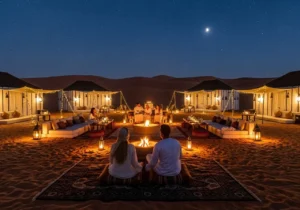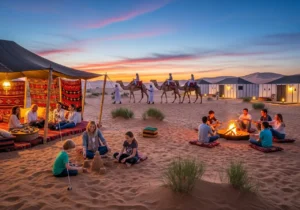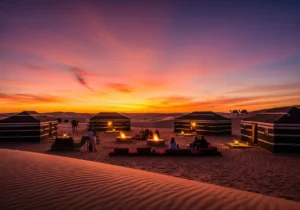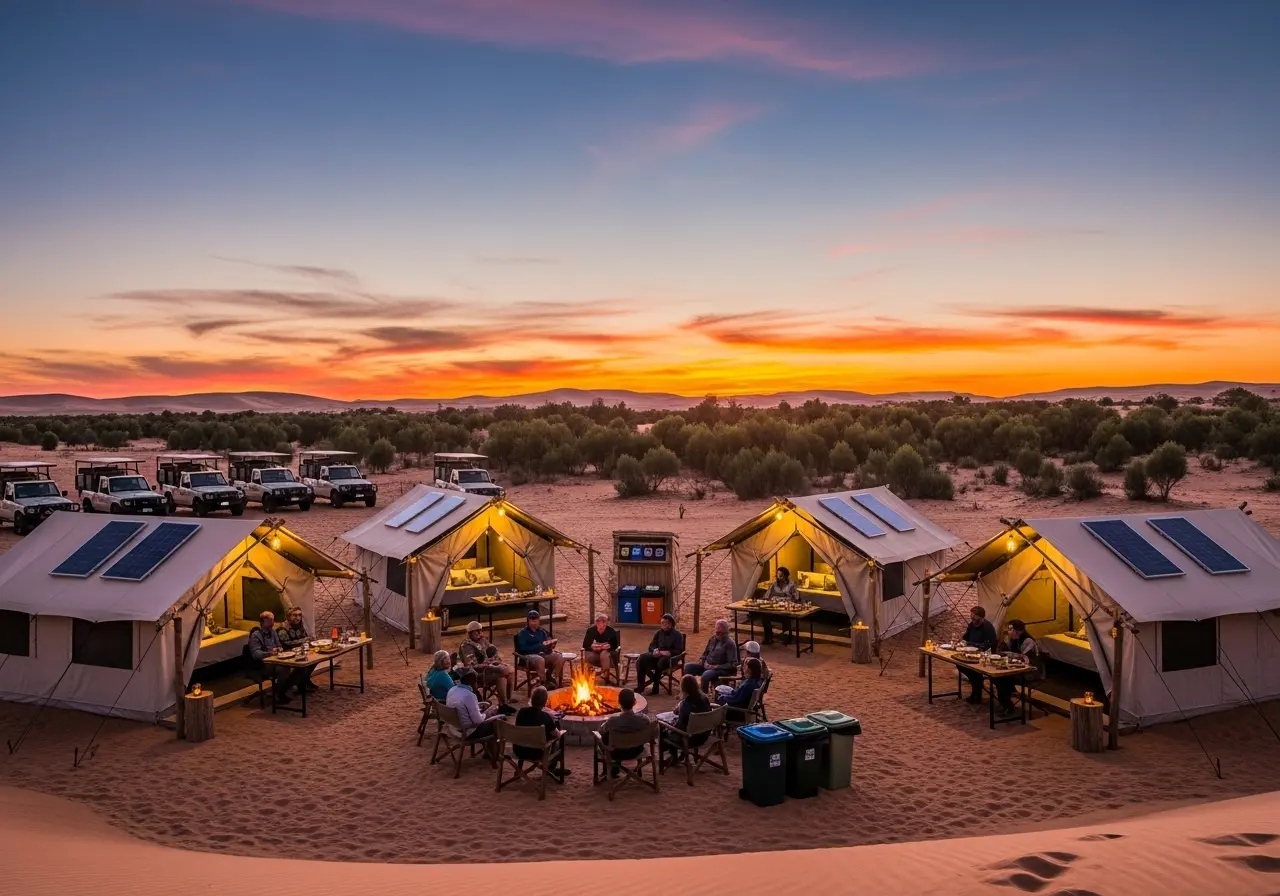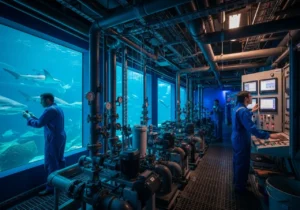A Greener Dune: How Eco-Friendly Desert Safari Camps Are Redefining the Adventure
The Arabian desert is a place of profound beauty and surprising fragility. For years, the iconic desert safari has been a must-do for visitors to Dubai, but with this popularity comes a great responsibility. This is your ultimate guide to one of the most important and exciting trends in Dubai tourism: the rise of Eco-Friendly Desert Safari Camps.
This in-depth exploration will take you on a journey into a new kind of desert adventure, one that prioritizes sustainability, conservation, and a deeper, more respectful connection with the natural environment. We will discover how Eco-Friendly Desert Safari Camps are transforming the industry, from harnessing the power of the sun to protecting the region’s precious wildlife.
We will delve into the innovative practices of water conservation, waste reduction, and ethical animal encounters. This guide will provide you with all the essential information you need to not only choose a sustainable safari for your 2025 trip but also to become a more responsible and conscious traveler.
Prepare to be inspired by a story of positive change. This guide will show you how Eco-Friendly Desert Safari Camps are ensuring that the magic of the desert can be preserved for generations to come, offering an experience that is not just thrilling, but also deeply meaningful.
The Need for Change: The Environmental Impact of Desert Tourism
To fully appreciate the importance of Eco-Friendly Desert Safari Camps, it is first essential to understand the delicate nature of the desert ecosystem and the challenges posed by traditional tourism.
The Fragile Desert Ecosystem
The desert may appear vast and empty, but it is a complex and delicate ecosystem teeming with specially adapted flora and fauna. The sand dunes themselves are a dynamic environment, and the sparse vegetation plays a crucial role in preventing soil erosion and supporting a variety of wildlife, from the majestic Arabian Oryx to smaller reptiles and insects.
The Challenges of Traditional Safaris
For many years, the focus of desert safaris was solely on entertainment. This sometimes led to practices that, while thrilling, had a negative impact on the environment.
- Dune Bashing: Unregulated off-roading can damage the delicate crust of the desert and disturb animal habitats.
- Waste Management: The remote nature of the camps made waste management a significant challenge, with the risk of litter and single-use plastics harming the environment.
- Resource Consumption: Traditional camps often relied on noisy and polluting diesel generators for power and consumed large amounts of water, a precious resource in the desert.
The rise of Eco-Friendly Desert Safari Camps is a direct and positive response to these challenges, representing a shift towards a more sustainable and responsible way of experiencing the desert.
Harnessing the Sun: The Rise of Solar Power in the Desert
One of the most significant and visible innovations at Eco-Friendly Desert Safari Camps is the widespread adoption of solar power. In a land blessed with abundant sunshine, this is a natural and brilliant solution.
How Solar Power Works in a Camp Setting
Modern camps are now equipped with large arrays of photovoltaic (PV) solar panels. These panels capture the intense energy of the desert sun during the day and store it in high-capacity battery systems.
This stored energy is then used to power the entire camp after sunset. This includes all the lighting, the kitchen facilities, the sound systems for the entertainment, and the restroom facilities.
The Benefits of Solar Power
The shift to solar power has had a transformative effect on the desert safari experience.
- Reducing Carbon Emissions: It completely eliminates the need for noisy, polluting diesel generators, significantly reducing the carbon footprint of the operation.
- A Quieter, More Authentic Experience: The absence of the constant hum of a generator allows for a much more peaceful and authentic desert experience. You can hear the silence of the desert and enjoy the entertainment without any distracting background noise.
- Sustainability in Action: It is a powerful and visible demonstration of the camp’s commitment to sustainability, providing an educational experience for guests.
What it Means for the Visitor
As a visitor to one of the Eco-Friendly Desert Safari Camps, you will notice a profound difference in the ambiance. The evenings are quieter, the air is cleaner, and the entire experience feels more in harmony with the natural surroundings.
Precious Drops: Water Conservation and Management
Water is the most precious resource in the desert. The most responsible Eco-Friendly Desert Safari Camps have implemented a range of innovative strategies to minimize their water consumption.
The Challenge of Water in the Desert
Operating a campsite that caters to hundreds of guests, with full kitchen and restroom facilities, requires a significant amount of water. Sourcing and using this water responsibly is a major challenge and a key focus of sustainable operators.
Innovative Water-Saving Solutions
- Water-Saving Fixtures: Modern camps are fitted with low-flow taps and dual-flush toilets in their restroom facilities to significantly reduce the amount of water used per guest.
- Greywater Recycling: Some of the most advanced Eco-Friendly Desert Safari Camps have systems in place to collect “greywater” (water from sinks and showers). This water is then treated and recycled for non-potable uses, such as irrigation for native plants around the campsite.
- Responsible Sourcing: Sustainable operators ensure that the water they bring to the camp is sourced responsibly and is not depleting local groundwater resources.
Educating Guests on Mindful Consumption
A key part of the water conservation effort involves the guests themselves. The camps often have polite signage in the restrooms encouraging visitors to be mindful of their water usage, helping to raise awareness about the importance of this precious resource in an arid environment.
Leaving No Trace: Waste Reduction and Management
The golden rule of any outdoor activity is to “Leave No Trace,” and this philosophy is at the very heart of the Eco-Friendly Desert Safari Camps movement.
The “Pack It In, Pack It Out” Philosophy
Responsible operators adhere to a strict policy of ensuring that every single piece of waste generated at the camp is collected and transported back to the city for proper disposal. This ensures that the pristine desert environment is left completely untouched.
The War on Single-Use Plastics
One of the biggest environmental challenges has been the reliance on single-use plastics, particularly plastic water bottles.
- Filtered Water Stations: The leading Eco-Friendly Desert Safari Camps have completely eliminated plastic water bottles. Instead, they provide high-quality, filtered drinking water from large dispensers and offer guests reusable cups.
- Proper Cutlery and Crockery: Instead of disposable plastic plates and cutlery for the dinner buffet, sustainable camps use proper, washable plates, metal cutlery, and glassware. This dramatically reduces the amount of plastic waste generated each evening.
Comprehensive Waste Segregation and Recycling
Beyond just reducing plastic, these camps have implemented comprehensive waste management systems. You will find clearly labeled bins for segregating different types of waste, such as food waste, plastics, and paper, ensuring that as much of it as possible can be composted or recycled.
Respect for the Wild: Ethical Wildlife Encounters
A crucial aspect of the Eco-Friendly Desert Safari Camps movement is a deep and profound respect for the desert’s native wildlife.
The Importance of Conservation Reserves
Many of the most responsible safari operators conduct their tours within the protected boundaries of the Dubai Desert Conservation Reserve (DDCR). This is a massive, protected area where the natural habitat is preserved and native species are protected.
Operating within the DDCR means adhering to a strict set of environmental regulations, including driving only on designated tracks to avoid damaging the delicate flora and fauna.
Responsible Wildlife Viewing
The focus of a nature drive in an eco-friendly safari is on respectful observation. The guides are trained to spot animals like the Arabian Oryx and gazelles and to allow guests to observe and photograph them from a safe and respectful distance, without chasing or disturbing them.
Ethical Animal Interactions
The Eco-Friendly Desert Safari Camps are also committed to the highest standards of animal welfare for the animals involved in the camp activities.
- Camel Riding: The camels are well-cared for, given plenty of rest, and are not overworked. The rides are typically short and gentle.
- Falconry: The falconry demonstrations are conducted by experienced and licensed professionals who have a deep respect for these magnificent birds and their cultural significance. The focus is on showcasing the falcon’s natural abilities in a way that is safe and stress-free for the bird.
How to Be a Responsible Tourist on Your Safari
As a traveler, you also have a vital role to play.
- Choose a Certified Operator: Look for tour operators that have recognized eco-certifications or a clearly stated and transparent environmental policy.
- Respect Wildlife: Never feed or touch any wild animals you encounter. Keep a respectful distance.
- Do Not Litter: This is the most important rule. Do not leave a single piece of rubbish behind in the desert.
- Stick to the Tracks: If you are on a self-drive adventure, never drive off the designated tracks.
- Conserve Water: Be mindful of your water usage at the camp facilities.
- Ask Questions: Engage with your guide and learn about the local ecosystem and the conservation efforts.
Choosing an Eco-Conscious Operator: Your Key to a Meaningful Adventure
The single most impactful decision you can make is to choose a tour operator that shares your commitment to sustainability. A company that has invested in the infrastructure and training to become one of the leading Eco-Friendly Desert Safari Camps is making a powerful statement.
When you choose a sustainable operator, you are not just buying a tour; you are supporting a business that is actively working to protect the beautiful desert environment that makes the entire experience possible.
Integrating Your Eco-Adventure with a Full Dubai Itinerary
Choosing to experience one of the Eco-Friendly Desert Safari Camps is a fantastic way to add a layer of meaning and purpose to your Dubai vacation. It shows a commitment to responsible travel that is both rewarding and educational.
To ensure you are booking a truly premium and authentic adventure that aligns with these sustainable values, consider an operator that specializes in high-quality and respectful desert experiences. A company like https://royaldesertadventures.ae/ can provide an unforgettable, all-inclusive safari that combines thrilling adventure with a deep respect for the desert environment and its cultural heritage.
When planning your overall Dubai vacation, it can be very helpful to work with experienced local tour companies who can guide you to the most responsible operators. Reputable providers such as https://dubaidesertsafarie.com/ offer a comprehensive range of city tours and desert adventures. For planning diverse excursions and activities across the UAE, https://hafiztourism.com/ is another excellent and trusted partner that can help you craft your perfect, sustainable vacation.
Frequently Asked Questions (FAQs)
- What is the main difference between a standard and an eco-friendly desert safari? The main difference lies in the operator’s commitment to minimizing their environmental impact. Eco-Friendly Desert Safari Camps prioritize sustainability through practices like using solar power instead of diesel generators, implementing comprehensive water conservation and waste reduction strategies, and ensuring all wildlife encounters are ethical and respectful.
- How can I identify an eco-friendly tour operator? Look for specific information on their website regarding their sustainability policies. They will often highlight their use of solar power, their efforts to eliminate single-use plastics, and their partnership with conservation bodies like the Dubai Desert Conservation Reserve (DDCR). Look for recognized eco-certifications as well.
- Does an eco-friendly safari compromise on the fun and thrills? Not at all. In fact, it often enhances the experience. The dune bashing is still just as thrilling, but it is done in a more responsible way on designated tracks. The camp experience is often more pleasant and authentic due to the absence of noisy generators and a greater focus on the natural environment.
- What is the Dubai Desert Conservation Reserve (DDCR)? The DDCR is a massive, 225-square-kilometer protected area of the desert. It is a national park dedicated to preserving the natural landscape and protecting native Arabian wildlife. The most reputable and eco-conscious safari operators are given special permission to conduct their tours within this pristine reserve.
- Are the wildlife encounters on an eco-friendly safari ethical? Yes, this is a core principle. The focus is on the welfare of the animals. For camel riding, this means the animals are well-cared for and not overworked. For wildlife viewing, it means observing animals like the Arabian Oryx from a respectful distance without disturbing them or their natural habitat.
- What does “Leave No Trace” mean in the context of a desert safari? “Leave No Trace” is a core principle of responsible outdoor ethics. It means leaving the environment exactly as you found it, or even better. For a desert safari, this involves ensuring that every single piece of waste—from food scraps to tissues—is packed up and removed from the desert.
- How do Eco-Friendly Desert Safari Camps manage their waste? They have robust waste management systems. They significantly reduce the amount of waste created by avoiding single-use plastics and disposables. The waste that is generated is carefully segregated into different categories (food, plastic, paper, etc.) and is then transported back to the city for proper composting and recycling.
- Is dune bashing itself bad for the environment? Unregulated dune bashing can be harmful as it can damage the delicate crust of the desert and disturb vegetation. However, within the DDCR and other managed areas, the dune bashing conducted by licensed operators is done on carefully selected, designated routes to minimize the environmental impact.
- How does using solar power change the camp experience? Using solar power dramatically improves the ambiance of the camp. It eliminates the constant, loud hum and the exhaust fumes of a diesel generator. This allows you to enjoy a much quieter, more peaceful evening, where you can hear the sounds of traditional music and the silence of the desert, making the experience much more authentic.
- What is the most significant impact of reducing single-use plastics? The most significant impact is the reduction of non-biodegradable litter in a fragile ecosystem. Plastic waste can harm or kill wildlife and takes hundreds of years to break down. By eliminating items like plastic water bottles and disposable cutlery, Eco-Friendly Desert Safari Camps prevent thousands of pieces of plastic from potentially ending up in the pristine desert environment.
- Are eco-friendly safaris more expensive than standard ones? Sometimes they can be slightly more expensive, as there is a significant investment required in sustainable infrastructure like solar power systems and water treatment facilities. However, many travelers find that the enhanced, more authentic, and more meaningful experience is well worth the small price difference.
- How can I, as a tourist, contribute to the conservation efforts? You can contribute by choosing a reputable, eco-conscious tour operator for your safari. During your tour, you can be mindful of your water usage, ensure you do not leave any litter behind, and treat the natural environment and the wildlife with respect.
- What is “greywater recycling”? Greywater is the relatively clean wastewater from sinks and showers. Some advanced Eco-Friendly Desert Safari Camps have systems that collect this water, treat it, and then reuse it for purposes that do not require drinking-quality water, such as for flushing toilets or for carefully irrigating native desert plants.
- Does the food taste different at an eco-friendly camp? The food is just as delicious! The focus on sustainability often extends to the kitchen, with many eco-conscious camps prioritizing locally sourced ingredients where possible to reduce the carbon footprint of their food supply. The quality and variety of the barbecue dinner are still a major highlight.
- Why is it important to support Eco-Friendly Desert Safari Camps? Supporting these camps is important because you are voting with your wallet for a more sustainable and responsible form of tourism. You are encouraging more operators to adopt these positive practices, which helps to protect the beautiful and fragile desert ecosystem for future generations to enjoy.
A More Meaningful Adventure
The rise of Eco-Friendly Desert Safari Camps is a testament to Dubai’s commitment to a more sustainable future. It represents a beautiful evolution of the city’s most iconic adventure, transforming it into an experience that is not just thrilling and entertaining, but also deeply respectful of the environment that makes it all possible.
By choosing a sustainable safari, you are not just a tourist; you are a conscious traveler, a partner in conservation. You are choosing an adventure that is richer, quieter, more authentic, and leaves a positive impact. You are choosing to ensure that the profound magic of the Arabian desert will continue to inspire and captivate for generations to come.
